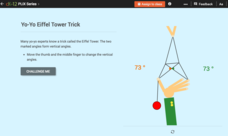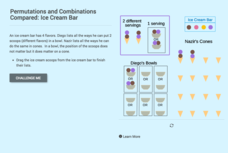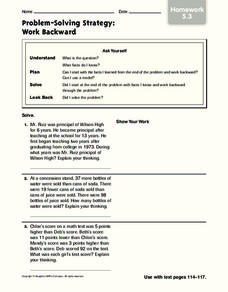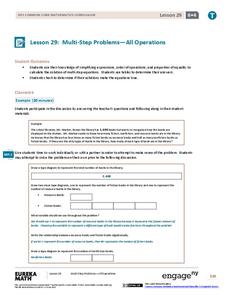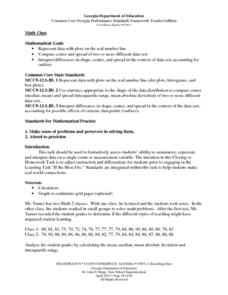CK-12 Foundation
Vertical Angles: Yo-Yo Eiffel Tower Trick
Yo, yo, learn about vertical angles with a yo-yo. Using an interactive, scholars adjust the position of fingers holding a design from a yo-yo. Answering a set of challenge questions based on the interactive helps clarify understanding of...
CK-12 Foundation
Absolute Value: Picket Fence Painting
Painting a fence can be useful for more than just making your yard look good. A slider interactive has young mathematicians adjust the number of white fence panels. This activity helps in understanding how absolute value equations...
CK-12 Foundation
Repeating Decimals: Does 1 equal 0.999... ?
Six questions make up a challenging interactive that tests scholars' knowledge of repeating decimals. Mathematicians answer true or false and multiple-choice questions with help from a tool that highlights decimal movement in an...
Math 4 Children
Perimeter and Area
Find the perimeter and area of different shapes with a helpful activity. After kids observe the measurements of each side, they find both the perimeter and area, and write it down on a line for the answer.
EduGAINs
Introduction to Solving Linear Systems
Word problems offer class members an opportunity to learn the concept of solving linear systems using graphs. Individuals choose a problem based upon preferences, break into groups to discuss solution methods and whether there...
CK-12 Foundation
Measurement of Probability
Stockings make your legs warmer and math more enjoyable. A drag-and-drop interactive has pupils take stockings out of drawers to calculate probabilities. This includes dependent events where the probabilities depend on previous stocking...
CK-12 Foundation
Graphs Using Slope-Intercept Form: Zip-Line
Zip lines aren't so scary when all your scholars use them for is math. Young mathematicians see how the slope of a zip-line to a building changes as the height changes. They answer a set of challenge questions regarding the scenario.
CK-12 Foundation
Permutations and Combinations Compared: Ice Cream Bar
Learning math from an ice cream shop—what a tasty treat! Individuals use an interactive to list all possibilities for a double-scoop ice cream. Along the way, they learn to distinguish between permutations and computations.
Language Resources UK
Numbers WS1
Combine Spanish, English, and basic calculations to help your class get a good grasp of Spanish numbers. The resource is made up of several different exercises that ask pupils to unscramble letters, translate words, and complete basic...
Curated OER
Problem-Solving Strategy: Work Backward: Homework
In this working backwards instructional activity, students review the understand, plan, solve, and look back problem solving strategy to help them work backwards and solve the word problems.
Curated OER
How to Take math Lectures Notes
In this math worksheet, students review the steps they were taught, to take correct notes in their math class. This worksheet can be used to teach students the correct process of note taking for just about any subject. There are 6...
Curated OER
Family Math Workshops
Students explore the math they are learning in the classroom with their families. In this math workshop lesson, participants learn about the types of mathematics being taught in the classroom. These workshops provide opportunities to...
Curated OER
Real Math
Students explore careers that require math knowledge and solve real life math problems. As a class, they compare and contrast classroom math to real life math and explore the links between algebra, geometry and math skills used in...
EngageNY
Factoring Expressions
Factor in an informative resource when teaching about factoring. The 11th activity in a 36-part module shows pupils how to factor algebraic expressions by applying the distributive property. Some of the problems involve expressions with...
EngageNY
Replacing Letters with Numbers II
Teach about properties properly. Individuals investigate the commutative and identity properties for both addition and multiplication. They see that the properties hold true for all values by using substitution to test out several examples.
EngageNY
The Euclidean Algorithm as an Application of the Long Division Algorithm
Individuals learn to apply the Euclidean algorithm to find the greatest common factor of two numbers. Additionally, the lesson connects greatest common factor to the largest square that can be drawn in a rectangle.
EngageNY
Symmetry in the Coordinate Plane
The 17th installment of a 21-part module investigates symmetry in the coordinate plane. After plotting several examples, scholars develop a rule for the coordinates of a point after reflecting over the x-axis, the y-axis, or both.
EngageNY
True and False Number Sentences II
Substitution is still the method of choice to verify number sentences. The detailed lesson has young mathematicians determining conditions for when number sentences are true or false through substitution. They learn to express these...
EngageNY
Multi-Step Problems—All Operations
Harness the power of algebra to solve problems. Young mathematicians learn to work out multi-step problems by applying algebraic techniques, such as solving equations and proportions. They use tape diagrams to model the problem to finish...
Georgia Department of Education
Math Class
Young analysts use real (provided) data from a class's test scores to practice using statistical tools. Not only do learners calculate measures of center and spread (including mean, median, deviation, and IQ range), but...
Scholastic
Problem-Soving Strategies, Practice 1: Sample
A variety of word problems help your learners examine the ways that they find solutions. Each question provides opportunities to add, subtract, and multiply time, measurements, and money.
Jude Mphoweh
Graphs
Searching for worksheets to include in an elementary math series on bar graphs? Then look no further! This collection of materials has exactly what you need to ensure that your learners get plenty of practice reading and analyzing...
Common Core Sheets
Determining Coordinates: Reading Positive & Negative Coordinates
For kids who have a hard time with graphing, a grid with coordinates can look like an unsolvable puzzle. A series of worksheets uses symbols and shapes like hearts, stars, and letters to help kids find the correct coordinates.
Shmoop
Box, Stem-Leaf, and Histogram
A helpful and versatile instructional activity requires young mathematicians to analyze data in order to create graphs and answer questions. Additionally, it prompts learners to find the mean, median, mode, and range of some of...


